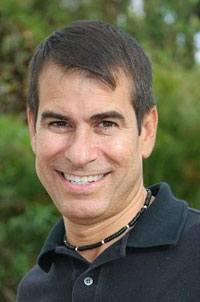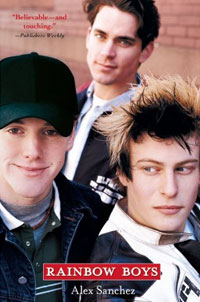This week, TheLatinoAuthor.com is featuring author Alex Sanchez. Born in Mexico, Alex immigrated to the United States with his family when he was five. He received his master’s degree in guidance and counseling from Old Dominion University and now he divides his time between Florida and Thailand. Read our interview with Alex to hear about some of his internal struggles and what compelled him to pursue his career as an author.


Can you begin by telling us a little bit about yourself; where you grew up, where you currently reside, family upbringing, or anything you would like our readers to know about you?
So much of what I write stems from my experiences with identity. My dad was Mexican from a German immigrant family. My mom was Cuban. I was born in Mexico, but moved to Texas when I was five. I experienced prejudice being an immigrant and coming to schools that had only recently been desegregated between Mexican and white kids. I grew up romantically attracted to both girls and boys. I experienced the secrecy and shame of yearning for the same sex. I loved and hated my family. Everywhere I went I always felt like an outsider, and yet I became skilled at blending in. For a writer, all those sorts of conflicting experiences are a goldmine of emotion to draw upon. Nowadays, I still see those themes playing out in my life. Ever since my books were translated and published in Thailand eight years ago, I’ve spent much of each year there, challenging myself with a new culture I love. One day I’ll write specifically about it, and in the meantime, the experience helps to continue to challenge my identity.
What prompted you to become a writer and to write about the gay experience? Was it because of your personal background, or was it therapeutic, or both?
I write the books I wish had been available for me to read when I was a teen. Books that would’ve told me “It’s okay to be who you are.” I write remembering what it was like to grow up feeling different because I was an immigrant and because of same-sex longings. Since I wasn’t able to voice and sort out that confusion at the time, those conflicting feelings got frozen up inside of me. They’ve thawed in large part through my writing. In that sense, I find writing tremendously therapeutic. Writing is how I sort out the world. And as express my own struggles, my stories have helped others to understand their own experiences. It amazes me how, in spite of society’s changes, so many young people continue to endure similar struggles.
Do you find that being Latino or gay has helped or hindered your career in the writing business? Please elaborate.
Hmmm… I think that being Latino and being gay has neither helped nor hindered my career, but writing about those experiences has both helped and hindered. Specifically, writing about the controversial issue of gay teenagers has brought more attention to my books than if I were writing about straight teens. The same goes for writing about Latino teens at a time when there is an ever increasing interest about what it is like to grow up Latino. In those ways, being gay and Latino have helped. But at the same time, in general, people tend to read about peers, so books about a minority experience tend to have a smaller readership. Of course, there are always best-selling exceptions and there are many readers who like to read about people different than themselves, but I believe the generalization stands. In that sense, the topics I feel passionate to write about may have a smaller readership, but I get attention because I write about them. It’s a tradeoff.
What type of marketing challenges have you faced in the literary world? Has this been more due to homophobia, being a Latino writer, or just general overall marketing?
Every writer I know struggles with marketing challenges. We all want to have our work known by the biggest audience possible and we all struggle with how to accomplish that. Yes, homophobia and prejudice exist, but I alone can’t change that overnight. What I can do is seek out and work with allies within the writing and reading community (agents, editors, librarians, and teachers) who want to address those challenges. Those allies exist, and I’ve learned much by working with them. They’ve helped me tremendously. They are among my biggest champions and heroes.
In the writing business, what is the most difficult obstacle you’ve faced yet? If you had to face this again, how would you approach it this time around?
The biggest obstacle in my life has always been me. With every manuscript I write I struggle with getting my lazy and antsy butt to sit down, be still, and write. And even after eight published books, I continue to need to study, learn, and relearn what makes good writing. I have to dig deep and be as honest as possible in what I write. That can be very hard. Also, I constantly need to set aside my jealousy and envy of the success of other writers, avoid comparing myself to those authors and not think of myself as a victim because they’ve had advantages I haven’t had. The more I can remember that I am my biggest problem, the more success I can have, because I am the one thing I have the most chance of changing.
Who in your life (family, friends, or other authors) has been most influential to keep you on the writing career rollercoaster?
Wow, I’m grateful to so many people: The authors whose books inspire me, writing instructors who have taught and encouraged me, my amazing agent who always believes in me, editors who help make my writing better, and family and friends who nurture me. Writing takes courage because we make ourselves vulnerable. I’m grateful to all the people in my life who give me that courage.
Where do you get your ideas and how much research do you do before beginning a book?
My ideas come from struggles I’ve experienced in my own life and that I see reflected in the lives of others. Research surrounding those ideas may include specifics about something technical like how to start a Gay-Straight Alliance at a school, or perhaps character research about the challenges Latino teens today may experience in wanting to fit in with non-Latino friends. As part of my research, I always try to ground-truth my manuscripts by asking at least one teen to read and give me feedback while I’m still writing.
Out of all your publications, which is the most you are proud of and why? Which of these did you find the most challenging to write?
I’m proud of my first published book, Rainbow Boys, because I was able to stick with it. One of my biggest writing blocks had always been to abandon projects before finishing them. I’m also proud of my book, The God Box, which deals with reconciling sexuality and spirituality because of all the young people who have told me that reading the story kept them from suicide. And I’m proud of my book Bait because I was able to write through the pain and tears of putting to paper a story I was so scared to share.
What is the one single advice you can provide to aspiring writers regarding this trade?
Learn! Focus on becoming the best writer you can be. Let go of wanting to be published and focus on learning the craft of writing. The better you write, the better your chances of being successful. As you learn to write, reach out to people who will give you emotional and career encouragement. Writing is such a solitary endeavor that it helps to have people to buoy us. And as you learn, write for the joy it brings you. If writing doesn’t give you joy, why do it?
When it’s all said and done, what do you hope to accomplish with your literary works? What do you want to be remembered for as an author?
My hope is to challenge, inspire, and empower others. If a book I’m reading (or writing) doesn’t do that, I put it aside and move on to one that does. One of the joys of writing books read by young people is the letters I receive telling me how my books impacted, changed, and even saved their lives. Who could ask for a greater tribute?
Can you give us a heads up as to any upcoming books or projects?
I spent the last couple of years writing a manuscript idea that ultimately did not work as a story. It was hard for me to let go of that project. All in all, it was a humbling experience. But now I’ve moved on to a new project I’ve very excited about. I’m not ready to talk about it yet, but readers can always keep up with me at my website, www.AlexSanchez.com. Thanks! Have courage and keep writing!
Contact: www.AlexSanchez.com





[…] The Latin Author […]